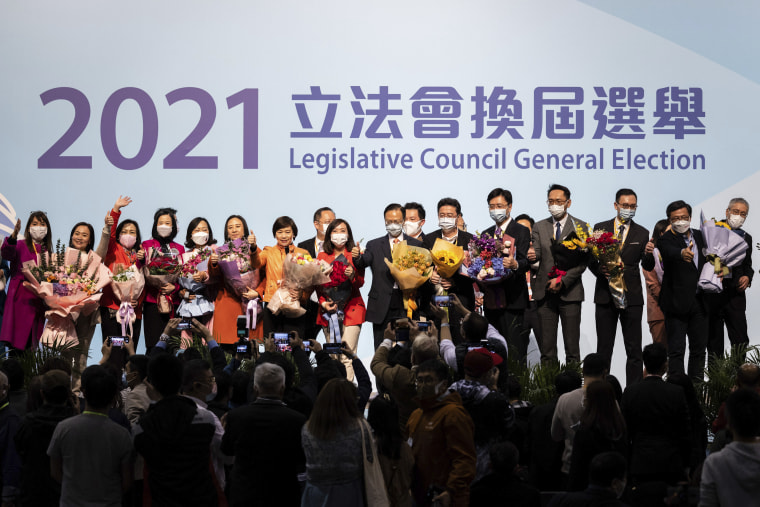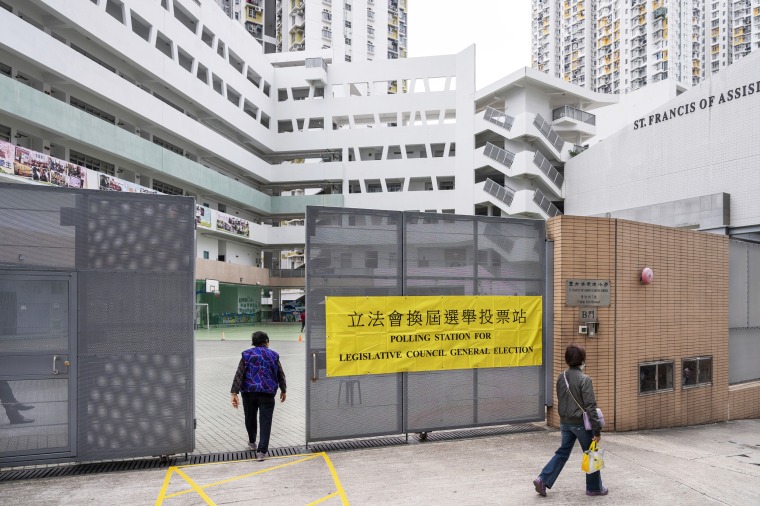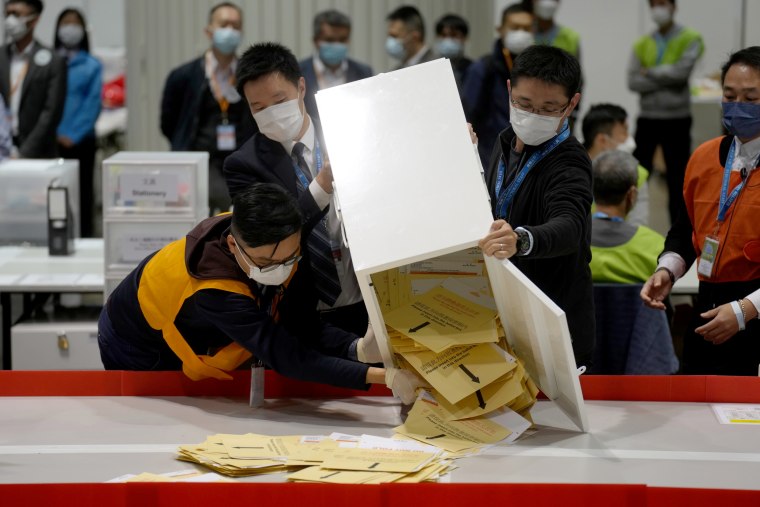The quiet scenes at the polling stations spoke volumes.
Entrances at some of Hong Kong’s 630 voting sites were empty on Sunday as the Chinese territory held an election for its legislature in which none of the pro-democracy parties were represented.
Others had just a few people lining up to vote in the first election since Beijing overhauled the city’s electoral system earlier this year. The changes included a reduction in the number of directly elected lawmakers and the introduction of vetting procedures to ensure that only “patriots” loyal to China could run.
Hong Kong officials said Monday that 30.2 percent of Hong Kong’s 4.4 million eligible voters had cast votes for the city’s legislature, known as the Legislative Council.
That compares with turnout of more than 58 percent in the last legislative election in 2016, and a record 71 percent in the district council election in 2019, in which pro-democracy candidates won a landslide victory.
“It’s a lot quieter this year, compared to the 2019 election,” one voter who identified himself as Mr. Wong told NBC News. He said he did not wish to give his first name because of security concerns.
Two years ago, he said, the lines were so long that he waited and gave up four or five times before finally casting his ballot.
By contrast, turnout on Sunday was the lowest since Hong Kong, a former British colony, returned to Chinese rule in 1997 under the principle of “one country, two systems,” which guaranteed the international financial hub greater civil liberties than exist in mainland China.
The election follows months of sometimes violent antigovernment protests in 2019, during which some protesters called for Hong Kong to seek independence. Beijing responded with a crackdown on dissent that includes a sweeping national security law imposed last year. Many of the territory’s democratic politicians are now in prison or awaiting trial, while others are barred from running, resigned from politics or in self-exile overseas.

Ted Hui, a former pro-democratic lawmaker who is now based in Australia, said Sunday that the low turnout “clearly showed” that people in Hong Kong saw voting as “irrelevant.”
“The candidates don’t represent them,” he told NBC News via a messaging app.
Boycotting the election, he said, was a way for Hong Kong voters to “resist tyranny when all other forms of expressions are made illegal.”
The election, originally scheduled for September 2020, was postponed for more than a year by the Hong Kong government, citing the coronavirus pandemic. Beijing’s electoral changes were implemented during that time, with supporters arguing they were necessary to break legislative gridlock.
While 90 seats were up for grabs on Sunday, only 20 were directly elected. Forty lawmakers were elected by the Election Committee, a 1,500-member pro-Beijing body, while the remaining 30 were elected by business groupings known as “functional constituencies.”
Although there were a handful of candidates from outside the pro-Beijing bloc, only one of them — Tik Chi-yuen, a social worker and self-described independent — was successful.
Jeffrey Wasserstrom, a professor of modern Chinese history at the University of California, Irvine, said that while many factors can affect voter numbers, “the strikingly low reported voter turnout in this one surely reflects a sense among many people that they simply were not being offered meaningful choices.”
“Some people likely skipped voting as a subtle act of protest,” he added, “while others just felt there was little point in bothering when the range of difference between options is tiny.”
In public remarks on Monday, Chief Executive Carrie Lam acknowledged the lower turnout but said that with 1.35 million people voting, “we can’t say it’s an unimportant election and not supported by many residents.”
She added that the 153 candidates “represented a wide range of people” and political views.

The government said Monday that Lam would visit Beijing this week “to brief state leaders on the latest economic, social and political situation in Hong Kong.”
Download the NBC News app for breaking news and politics
In a white paper issued on Monday, China’s State Council Information Office said that Hong Kong had enjoyed greater democracy since its return to Chinese rule, and that anti-China “agitators” working with “external forces” threatened that progress. It said the Chinese government had “restored order” in Hong Kong by imposing the national security law, overhauling the electoral system and requiring that public officeholders recognize Chinese sovereignty over the territory.
“Loving one’s country is a basic requirement for anyone engaged in state governance,” the paper said.
It added: “Having Hong Kong patriots govern Hong Kong does not exclude people with different political views or ideas, nor will criticism of the government be suppressed.”
To encourage voter turnout on Sunday, the local government took out front-page newspaper advertisements and made public transportation free. It also issued arrest warrants over calls to boycott the election or cast blank ballots, which is illegal under the new electoral law.
Hong Kong’s subway and bus lines were jammed with people, but instead of going to the polls many appeared to be headed to the beach or countryside. Long lines were reported at the city’s two theme parks.
Wasserstrom said the low turnout suggested Hong Kong voters had rejected the government narrative that this election was a sign of a healthy democracy.
“The goal was to have this very-far-from-ordinary election seem like an ordinary one,” he said, “and it just didn’t turn out that way.”
